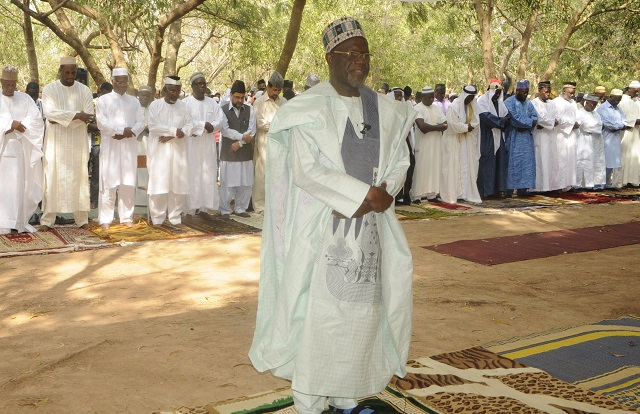
Muslims mark Eid-ul-Fitr today
Muslims across the country are expected to converge on open places and in mosques today to celebrate the end of the 29 or 30-day Ramadan fast.
Advertisement
The Eid-ul-Fitr is celebrated by Muslims worldwide to glorify and sanctify Allah for seeing them through the month-long period of fasting and forgiving them their sins.
Muslims are assured of Allah's forgiveness on the Eid-ul-Fitr, and so it is a day of immense joy for them.
In Ghana, Muslims, young and old, dressed in their nice attires, mainly white, pray in open places and in mosques in the early hours of the morning.
They would praise and glorify Allah on the way to the prayer grounds, intensify the praises and glorifications on the prayer grounds and do same on their way back home.
An Imam would lead the Muslims for the prayer, after which he would give a sermon on the essence of the Ramadan fast and the Ed-ul-Fitr.
Merrymaking
After the prayers, the Muslims get back to their various homes to prepare their favourite meals.
Rice and chicken is the best bet as it is the favourite meal for most children.
Some of them go traditional by preparing either rice balls or fufu with palm nut, groundnut or light soup.
It is also a day for visitations; Muslims visit their families and friends to celebrate the day.
After 3 p.m., many Muslims converge on some designated streets to celebrate the day as a community. The various ethnic groups, dressed in their traditional attires, are led by their chiefs on horsebacks to walk along the streets.
Essence of the Ramadan fast
The National Chief Imam, Sheikh Osmanu Nuhu Sharubutu, in a message thorough his Spokesperson, Sheikh Shaibu Armiyawo, said the Ramadan, the ninth month on the Islamic calendar, was a holy month devoted to the worship of Allah through fasting and prayer.
He said the month was unique because the Holy Qur'an was revealed in the month of Ramadan on the Night of Power. Prayer by Muslims on the Night of Power, which falls in the last 10 days of Ramadan, attracts rewards as if the Muslims were praying for 1000 months or 83 years and four months.
He said in the last 10 days, thousands of iniquitous people would gain amnesty from the torment of Hell fire.
Sheikh Sharubutu said that involved abstention from eating, drinking and sexual intercourse and also from all indecent human behaviour.
"It is a period to detach oneself from physical canal desires which subject human beings to temptation", he said.
The National Chief Imam referred to the Qur'an Chapter 2 versus 183, which says: "O you who believe, fasting has been made obligatory to you as was made obligatory to those before you that you may attain piety."
He said the attainment of piety helped Muslims to be Allah conscious and ultimately gain moral excellence and perfection.
Sheikh Sharubutu said Muslims exhibited honesty, compassion, tolerance, sympathy, respect for human life, respect for laws and social laws, promotion of harmony and peace in the month-long period of fasting.
Therefore, he said, Muslims were expected to let the virtues reflect in their lives throughout the year and beyond for the good of the country and the world.
Yearly overhauling
The Chairman of the National Representative Assembly of the Ahlussunna Wal Jama'a, Sheikh Salam Mohammed Alhassan, said Ramadan provided an opportunity for Muslims "to undergo yearly overhauling."
He added that Muslims got closer to Allah during the period through acts of worship, which they were not so much committed to in the other months.
Sheikh Salman quoted Prophet Muhammed (PBUH) as having said that whoever fasted and be with the Imam till the end of the month would be forgiven all his sins.
He said the Ramadan fasting period was for physical and spiritual cleansing for Muslims.
"It is a month of worship in all aspects, increase in the voluntary prayer and giving of charity", he said.
Essence of Eid-ul-Fitr
Sheikh Salman described the Eid-ul-Fitr as a day of joy for Muslims as they celebrated the spiritual and physical cleansing that they received during the fasting period.
He said Muslims glorified and praised Allah for the blessing and forgiveness that He promised them on that day.
Sheikh Salman said the visitations on the day was to cement the bond of relations among the people.
Besides, he said, Muslims were expected to eat the best of meals and be in new attires, and indicated that even if the attires were old, they needed to be washed well and ironed.
Sheikh Salman said Muslims were required to give uncooked rice or maize to the poor two days before, a day before or on the Eid-ul-Fitr day so they could also prepare their own meals.
He, therefore, said begging was forgiven on the Eid-ul-Fitr day as everyone was expected to have enough to eat.
Muslim youth cautioned
Sheikh Sharubutu and Sheikh Salman urged the Muslim youth to avoid reckless riding of motorbikes or driving during the celebration of Eid-ul-Fitr.
The Islamic scholars said coming out from the Holy month, Muslims were required to exhibit moderation, peace, tolerance, compassion and fellow feeling in all their dealings.
Therefore, they said, it would be a contradiction for Muslim youth to engage in reckless riding and driving that could cause loss of lives and injury to themselves and bystanders.
"It is unlawful to ride in car boots, dress shabbily or block roads without seeking permission," Sheikh Shaributu said.
"We have to avoid social disturbance. It is a day we need to enjoy not to be sad. They have to ride coolly and show the beauty of the occasion",,Sheikh Salman said.



